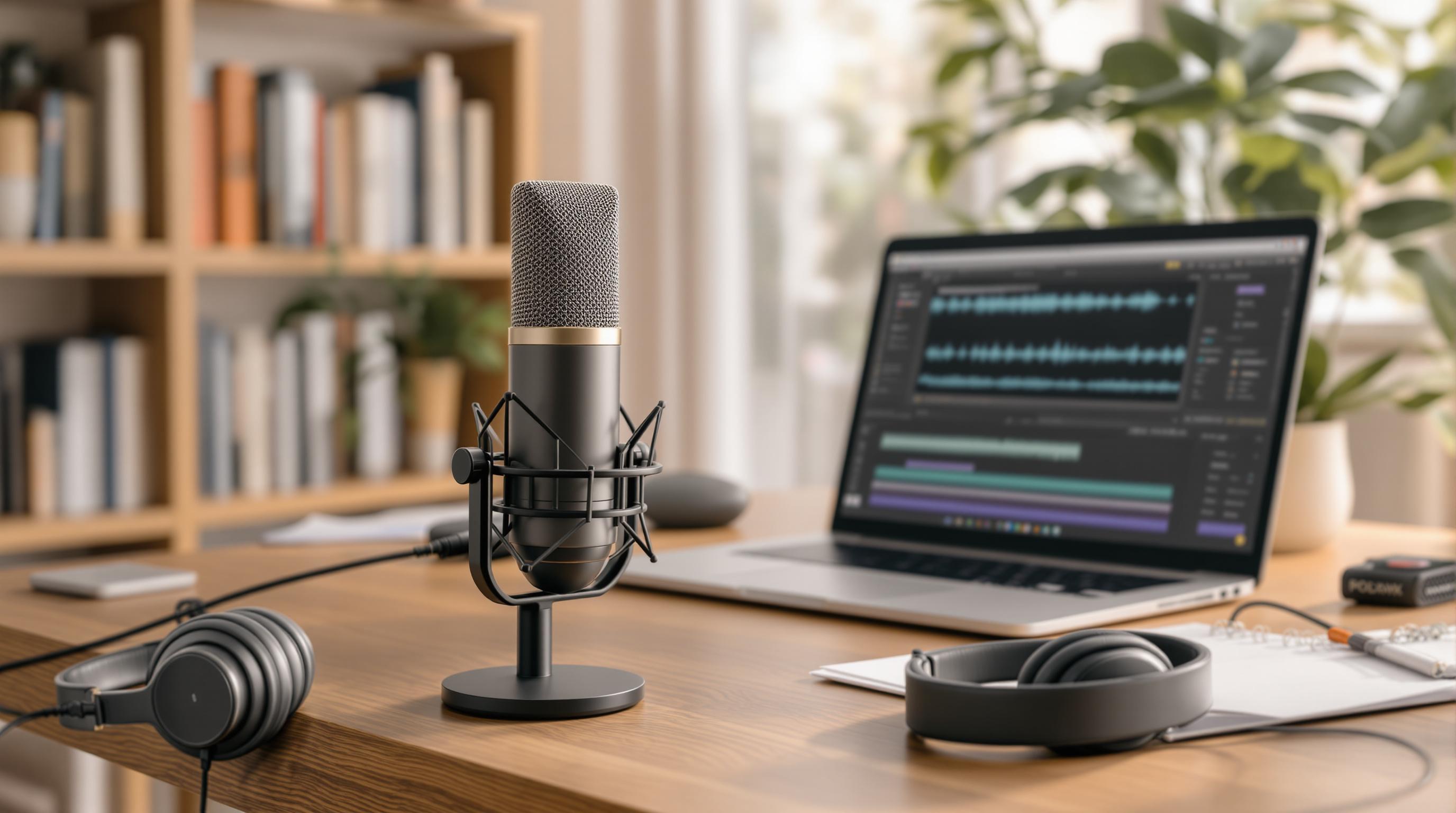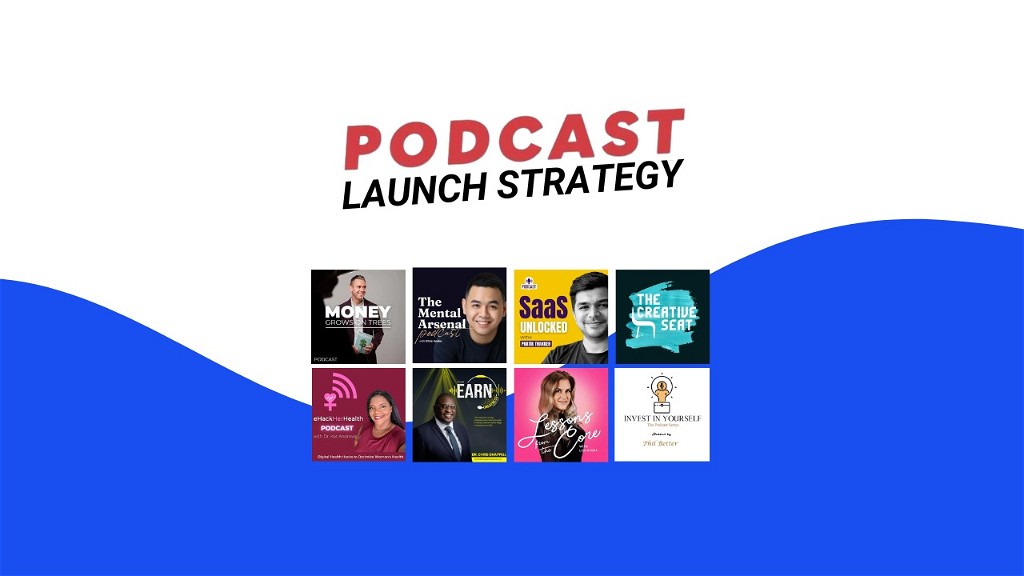A podcast content calendar is your show's roadmap. Here's what you need to know:
- It helps plan, organize, and schedule episodes
- Includes episode titles, release dates, guest info, and promotion plans
- Keeps you consistent and reduces stress
Key steps to create your podcast content calendar:
- Choose your publishing frequency
- Brainstorm episode ideas
- Set release dates
- Plan for guests
- Outline production tasks
- Sync with marketing efforts
| Tool | Best For | Key Feature |
|---|---|---|
| Google Calendar | Simplicity | Easy sharing |
| Trello | Visual planners | Board layout |
| Asana | Teams | Task management |
| Spreadsheets | Budget-conscious | Customization |
Remember:
- Record 4+ episodes before launch
- Keep a month of content ready
- Review and adjust regularly
A well-managed content calendar helps you deliver value consistently, grow your audience, and avoid last-minute scrambles.
Related video from YouTube
Why use a content calendar?
A content calendar isn't just a fancy tool. It's the backbone of a successful podcast. Here's why you need one:
Perks of content calendars
Content calendars can transform your podcasting process:
- Save time by planning ahead
- Keep your ideas organized
- Develop a solid content strategy
- Improve team collaboration
Keeping podcasts regular
Consistency is key in podcasting. A content calendar helps you:
- Meet audience expectations
- Avoid podfading (quitting after a few episodes)
- Create a buffer of ready-to-go content
"A content planner makes you think about where you'll be in one, two, three weeks from now. It helps you take the helicopter view and consider what you can achieve with your podcast in the long run."
This quote nails it. A content calendar gives you that big-picture view, keeping you focused on your podcasting goals.
Remember: A content calendar isn't just about organizing. It's about setting yourself up for long-term success.
What goes in a podcast content calendar?
A podcast content calendar isn't just a schedule. It's your show's backbone. Here's what to include:
Episode names and topics
List your episode ideas. This helps you track your content pipeline and mix up your themes.
For a business podcast, you might plan:
- "5 Ways to Boost Small Business Sales"
- "Interview with [CEO Name]"
- "Breaking Down Market Trends"
Release schedule
Pick a consistent release day and time. Weekly? Bi-weekly? Monthly? Choose what works for your audience. Many business podcasts drop new episodes on Tuesday mornings.
Guest details
For interviews, track:
| Guest Name | Contact | Interview Date | Topic |
|---|---|---|---|
| Jane Doe | jane@email.com | 5/15/2023 | Marketing strategies |
| John Smith | john@email.com | 5/22/2023 | Startup funding |
Production timeline
Set clear deadlines:
- Research: 2 weeks before release
- Recording: 1 week before release
- Editing: 3 days before release
- Final checks: 1 day before release
This keeps you on track and avoids last-minute scrambles.
Promotion plan
Plan how you'll promote each episode. This could include:
- Social media posts
- Email blasts
- Cross-promotion with other podcasts
For each episode, you might schedule:
- A teaser tweet the day before
- An announcement tweet on release day
- A follow-up tweet with a key quote the day after
Your content calendar keeps everything organized. It's your roadmap to consistent, quality content.
Picking the right tools
Let's talk about tools that can make your podcast planning a breeze.
Online calendars
Google Calendar and Outlook are solid choices. They're easy to use and great for team collaboration. You can set up recurring events for your weekly episodes and share the calendar with your crew.
Project planning software
Want something more robust? Check these out:
| Tool | What it's good for | Who it's for |
|---|---|---|
| Trello | Visual organization | People who like boards and cards |
| Notion | Detailed planning | Those who want an all-in-one workspace |
| Asana | Team collaboration | Folks who need different task views |
Trello's free plan is perfect for solo podcasters on a budget. Notion lets you organize every little detail of your podcast. Asana is great for both solo acts and teams.
Spreadsheets
Google Sheets is a solid choice if you're flying solo and watching your wallet. It's cloud-based, so you can collaborate easily and whip up a marketing calendar in no time.
Podcast-specific tools
Some tools are made just for podcasters. Take the Coefficient Podcast Content Calendar, for example. It works with Google Calendar and includes:
- Fields for episode titles and guest info
- Automatic reminders for deadlines
- Integration with other productivity tools
Here's how to use it:
- Download the template
- Fill it out with your ideas and schedules
- Set up reminders
- Keep it updated based on how your show's doing
Pick the tool that fits your style and budget. The right one will make your podcast planning a whole lot easier.
How to make your podcast content calendar
Here's a simple way to create a podcast content calendar:
Decide how often to podcast
Pick a schedule you can stick to. Weekly? Bi-monthly? Monthly? Choose what works for you and your listeners.
"Record at least 4 episodes before launching, and always have a month's worth of episodes ready. It's the best way to avoid podfade." - Add Saucedo, Podcast Planner Creator
Come up with episode ideas
Brainstorm topics that fit your podcast's theme. Use keyword research and industry trends. Keep a list of ideas handy.
Plan themes and series
Group related episodes into themes or series. It gives your podcast structure and sets listener expectations.
Set dates for episodes
Match your ideas to release dates. It keeps you on track and helps with planning.
| Month | Theme | Episode Ideas | Release Dates |
|---|---|---|---|
| January | New Year, New You | 1. Goal Setting 2. Habit Formation 3. Productivity Hacks |
Jan 7, 14, 21 |
| February | Love and Relationships | 1. Communication Skills 2. Dating Tips 3. Self-Love |
Feb 4, 11, 18 |
Plan for guests
Scheduling guests? Do it early. Note their contact info and any prep work needed.
Want to make it easier? Use tools like Asana or Trello. They help you assign tasks, set deadlines, and track progress.
sbb-itb-cdb7710
Tips for managing your calendar well
Record multiple episodes at once
Want to save time? Try batch recording. Some podcasters knock out up to five episodes in a day. Here's how:
- Group 3-5 related topics
- Block off uninterrupted time
- Double-check your gear
- Take quick breaks between episodes
"Batching your content ahead of time will help you keep your word." - Stephanie Judice, Author
Have backup episodes ready
Keep a month's worth of episodes in your back pocket. Why? It helps you:
- Stick to your schedule
- Avoid content gaps
- Stay calm when life gets crazy
This buffer can prevent "podfade" - that slow drop in podcast output.
Mix timeless and current content
Balance evergreen topics with timely ones. It keeps things fresh for your listeners.
| Content | Pros | Examples |
|---|---|---|
| Evergreen | Always relevant | How-tos, basic concepts |
| Timely | On-trend | News breakdowns, hot topics |
"The thing about evergreen content that I have seen is that it in itself is an investment, and it is worth investing in the highest possible quality you can make." - Dan Misener, Head of Strategy and Audience Development at Pacific Content
Use listener feedback
Let your audience guide your content. It boosts engagement and keeps your podcast on point.
How to tap into feedback:
- Ask for comments in each episode
- Run social media polls
- Respond to reviews
- Track your most popular episodes
Linking calendar to production work
Let's connect your content calendar to your podcast production. Here's how:
Before recording tasks
Get ready with this pre-recording checklist:
- Research topic
- Write outline or script
- Confirm guest (if needed)
- Test equipment
- Prepare questions or talking points
When to record
Align your recording schedule with your content calendar:
| Frequency | Recording Schedule |
|---|---|
| Weekly | Every Monday morning |
| Bi-weekly | First and third Saturdays |
| Monthly | Last Friday of each month |
Stick to it. Consistency is key.
After recording tasks
Here's your post-recording workflow:
1. Back up raw audio
2. Edit episode
3. Mix and master audio
4. Write show notes and create artwork
5. Upload to hosting platform
6. Schedule social media posts
Checking episode quality
Don't skip quality control:
- Listen to the final edit
- Get a second opinion if possible
- Check audio levels and clarity
- Double-check show notes
Matching calendar with marketing
Sync your marketing plans with your podcast content calendar. Here's how:
Plan social media posts
Time your social posts with episode drops:
| Episode Release | Social Media Schedule |
|---|---|
| Monday 6 AM | Sunday 8 PM: Teaser |
| Monday 7 AM: Episode link | |
| Monday 2 PM: Quote graphic | |
| Tuesday 10 AM: Behind-the-scenes |
This keeps your audience hooked all week.
Schedule email updates
Use emails to keep subscribers in the loop:
- Weekly newsletter on Fridays with episode teasers
- Episode emails 1 hour after each release
- Monthly recap highlighting top episodes and listener feedback
Work with other podcasts
Team up with other shows:
- Be a guest on other podcasts
- Do cross-promotion episodes
- Host joint live events
For example, "Crime Junkie" often teams up with "Dateline NBC" for special crossover episodes. It's a win-win for both shows' audiences.
Keeping your calendar flexible
A flexible podcast calendar helps you stay current and adapt. Here's how to keep your schedule nimble:
Respond to current events
Add timely topics when big news breaks. When COVID-19 hit in 2020, many podcasts pivoted to cover it. The New York Times' "The Daily" podcast focused entirely on coronavirus for months, seeing a 60% jump in downloads.
To stay responsive:
- Set aside monthly "flex slots" for current events
- Follow industry news to spot trends
- Have a process for quick research and production
Handle sudden changes
Guest cancellations or tech issues can derail your schedule. Be ready:
- Keep "evergreen" episodes as backups
- Cross-train team members
- Have a plan to notify listeners about changes
When "This American Life" delayed an episode for fact-checking in 2021, they swapped in a rerun and explained on social media.
Adjust for different seasons
Match your content with holidays and seasonal events:
| Season | Content Ideas |
|---|---|
| Summer | Travel, outdoor activities |
| Fall | Back-to-school, Halloween |
| Winter | Gift guides, year-in-review |
| Spring | Gardening, spring cleaning |
"My Favorite Murder" does an annual "Hometown Halloween" series with listener-submitted ghost stories. This seasonal content drives higher engagement and downloads.
Check and improve your calendar
To keep your podcast calendar effective, review and refine it regularly:
Track performance
Use these metrics to gauge your calendar's effectiveness:
- Episode downloads 7 days post-release
- Listener retention rates
- Engagement (comments, shares)
"How I Built This" podcast maintains a bi-weekly schedule, building a loyal audience with consistent release dates.
Adapt based on listener data
Use audience insights to enhance your podcast:
- Analyze comments and feedback
- Identify top-performing episodes
- Pinpoint listener drop-off points
Firstory Studio boosted feedback by creating a multi-platform comment link, resulting in 67.5% of early users leaving comments.
Optimize planning
Continuously improve your podcast planning:
- Set growth targets (downloads, comments)
- Review goals regularly
- Self-audit episodes for improvement areas
| Metric | Frequency | Importance |
|---|---|---|
| Downloads | Weekly | Audience growth indicator |
| Listener feedback | Per episode | Content effectiveness gauge |
| Release schedule | Monthly | Consistency check |
| Episode topics | Quarterly | Content freshness assessment |
Conclusion
A podcast content calendar isn't just a nice-to-have - it's a must-have for serious podcasters. Here's why:
It helps you plan episodes, stick to a schedule, manage tasks, and promote your show. Simple as that.
Key takeaways:
- Get ahead: Record 4+ episodes before launch. Keep a month's worth ready.
- Be a clock: Publish regularly. Your listeners will thank you.
- Roll with it: Your calendar isn't set in stone. Tweak it based on feedback and data.
- Think big picture: Use your calendar for more than just episodes. Plan your social posts and emails too.
Your content calendar action plan:
1. Pick your tool (Trello, Excel, Google Sheets - whatever works)
2. Set your publishing rhythm
3. Map out your topics
4. Lock in your deadlines
5. Keep it fresh with regular reviews
| What to do | How often | Why bother |
|---|---|---|
| Plan content | Monthly | Keep the ideas flowing |
| Record episodes | Weekly/Bi-weekly | Build a content cushion |
| Check performance | Monthly | Spot what's working (and what's not) |
| Update calendar | Quarterly | Stay in sync with your goals and audience |




